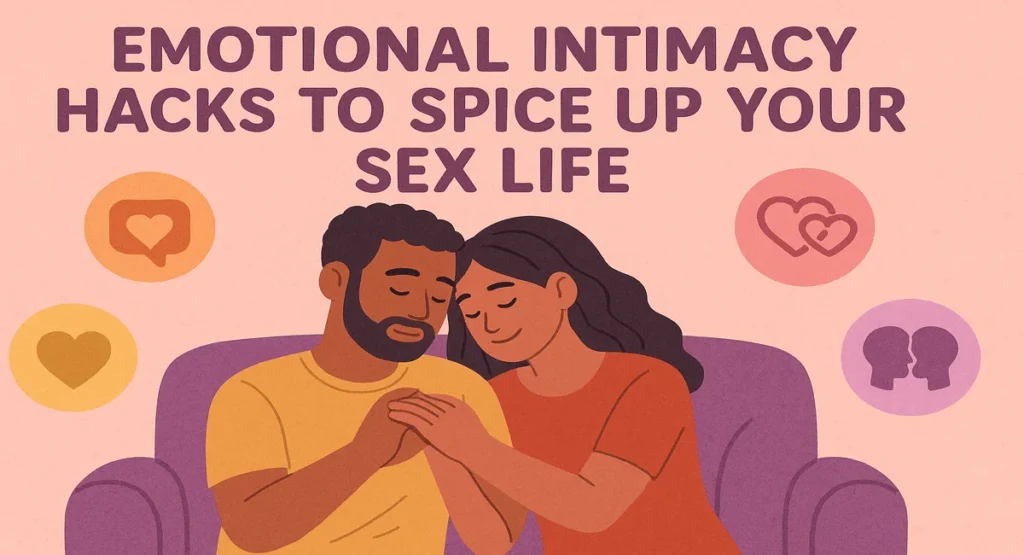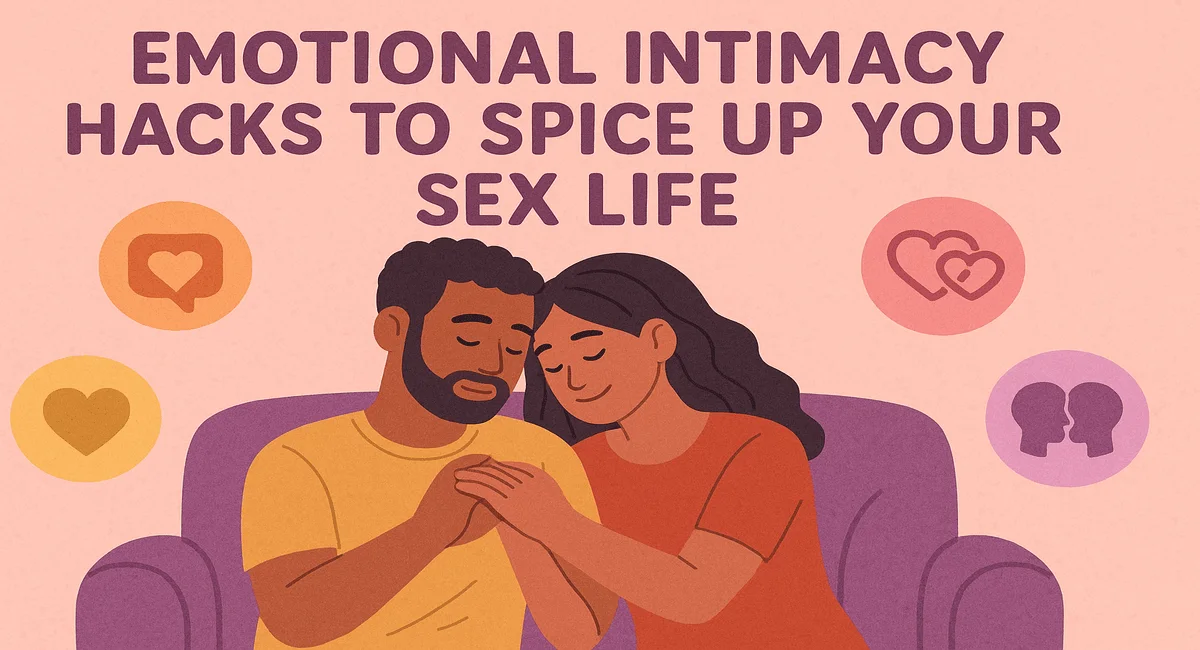The secret to a mind-blowing sex life isn’t just physical—it’s emotional. While physical attraction and chemistry are important, emotional intimacy is the cornerstone of a deeply satisfying and passionate sex life. When you feel emotionally connected to your partner, the physical connection becomes more intense, fulfilling, and meaningful.
In this article, we’ll dive into the science behind emotional connection and sexual desire, reveal expert-backed tips to build stronger vulnerable connection, and tackle common roadblocks that may be holding your relationship back. Whether you’re in a new relationship or have been together for years, these practical hacks can help reignite passion and bring you closer than ever.
Table of Contents
The Science Behind Emotional Intimacy and Sexual Satisfaction
Research Insights: Studies consistently show that emotional closeness is a key predictor of sexual satisfaction. According to research published in the Journal of Sex & Marital Therapy, couples who feel emotionally connected report higher levels of desire, arousal, and overall satisfaction in their sex lives.
Hormonal Connection: Oxytocin, commonly known as the “love hormone,” is essential for fostering emotional connections and strengthening intimacy. This hormone is released during physical touch, eye contact, and emotional conversations, fostering trust and closeness. The more oxytocin you produce, the stronger your emotional and physical connection becomes.

Strengthen Emotional Connection to Heat Up Your Love Life
Emotional connection fuels passion and deepens physical connections, making it essential for a vibrant sex life. Here are four proven emotional connection hacks to help you reignite the spark and deepen your connection with your partner
Hack 1: Schedule Regular Check-Ins
Regular check-ins help build emotional trust by keeping communication open and honest. Setting aside just 15–30 minutes each week to talk about feelings, needs, and relationship goals can strengthen your emotional bond. This emotional connection creates a safe, trusting space that naturally enhances physical intimacy and boosts your sex life. Keep it simple, distraction-free, and supportive for best results.
Why It Works?
Life’s demands can often pull couples apart, leaving little room for meaningful conversations. Regular check-ins create a dedicated space for open communication, ensuring that both partners feel heard, valued, and emotionally connected. This practice strengthens trust and fosters a deeper understanding of each other’s needs and desires.
How to Do It?
Set aside 10-15 minutes daily or weekly to engage in intentional conversations. Use this time to ask thoughtful, open-ended questions that encourage vulnerability and honesty. Examples include:
- “How are you feeling about us lately?”
- “What can I do to support you better?”
- “Is there anything you’d like to talk about or share your thoughts on?”
By consistently checking in, you create a safe space for emotional expression, which can translate into a more passionate and connected relationship.
Hack 2: Practice Gratitude Daily
Taking a moment each day to show appreciation for your partner can make a big difference in your relationship. Whether it’s a kind word, a thank-you, or simply noticing something they did, small acts of gratitude help your partner feel valued and loved. This kind of emotional recognition builds trust, reduces stress, and brings you closer—both emotionally and physically. When your partner feels appreciated, it naturally boosts intimacy and strengthens your connection in and out of the bedroom.
Why It Works
Gratitude is a powerful tool for fostering emotional intimacy. When you focus on the positive aspects of your partner and your relationship, it cultivates a sense of appreciation and mutual respect. This positive reinforcement strengthens your bond and creates a more loving and supportive environment.
How to Do It
Make it a routine to regularly show appreciation to your partner. Be specific and genuine in your appreciation. For example:
- “I truly admire how you always manage to lift my spirits with laughter, even on the toughest days.”
- I sincerely appreciate your patience and understanding as I managed a busy week. Your support truly means a lot—thank you!
These small but meaningful gestures can significantly enhance emotional closeness and set the stage for a more intimate physical connection.
Hack 3: Explore Each Other’s Love Languages
Understanding and speaking your partner’s love language is key to building intimate understanding. Whether it’s words of affirmation, quality time, physical touch, acts of service, or receiving gifts—knowing how your partner feels loved helps you connect on a deeper level. When emotional needs are met, physical intimacy becomes more meaningful, leading to a stronger and more passionate sex life.
Why It Works
Understanding your partner’s love language is key to meeting their emotional needs. When you express love in a way that resonates with them, it deepens their sense of being valued and understood. This emotional fulfillment often leads to a more passionate and satisfying physical relationship.
How to Do It
Take a love language quiz together to identify how each of you prefers to give and receive love. The five love languages are:
- Words of Affirmation: Compliments, verbal appreciation, and encouragement.
- Acts of Service: Helping with tasks or doing something thoughtful.
- Receiving Gifts: Thoughtful presents that show you care.
- Quality Time: Undivided attention and meaningful time together.
- Physical Touch: Hugs, kisses, cuddling, and other forms of affection.
Once you know your partner’s love language, make a conscious effort to express love in ways that align with it. For instance:
- If their love language is physical touch, prioritize cuddling or holding hands.
- If it’s words of affirmation, leave them a heartfelt note or compliment them often.
By speaking their love language, you’ll create a stronger emotional connection that enhances your physical intimacy.

Hack 4: Try New Things Together
Sharing new experiences as a couple is a powerful way to deepen couple’s emotional bond. Whether it’s exploring a new hobby, traveling somewhere new, or trying something different in your relationship, stepping outside your comfort zone together builds trust, excitement, and connection. These shared moments create lasting memories and strengthen your emotional bond, which naturally translates into a more passionate and connected sex life. The secret is to stay curious and grow side by side.
Why It Works
Shared experiences create lasting memories and reignite the spark in your relationship. But to fully enjoy these moments, it’s important to feel confident in your physical health. If you’re looking to support your prostate health and improve sexual function,
ProstaVive can be a great addition to your wellness routine. Its natural formula is designed to promote a healthy prostate and enhance vitality, so you can focus on building deeper connections with your partner.
How to Do It
Step out of your comfort zone and explore new activities as a couple. Here are some ideas to get started:
- Take a dance or cooking class together.
- Plan a weekend getaway to a new destination.
- Experiment with new ideas in the bedroom, such as role-playing or introducing new elements to your routine.
The key is to focus on the experience itself, rather than the outcome. By embracing novelty together, you’ll strengthen your emotional bond and keep the excitement alive in your relationship.
Overcoming Common Barriers to Emotional Intimacy
Emotional intimacy is vital for meaningful relationships, but many struggle to achieve it due to past trauma, busy lifestyles, or fear of vulnerability. These barriers create emotional distance, but with the right strategies, you can overcome them and build deeper connections.
Barrier 1: Past Trauma or Trust Issues
Seek therapy or counseling to address unresolved trauma, and consider how physical health can also impact your emotional and sexual well-being. For men, maintaining a healthy prostate is key to feeling confident and vibrant. ProstaVive is a natural supplement that supports prostate health and can help improve sexual function, making it easier to rebuild trust and intimacy in your relationship.
We always recommend our users to contact healthcare professional before taking any medicines or supplements.
How to Overcome It?
Seek Therapy or Counseling
Professional help is one of the most effective ways to address unresolved trauma. Therapists can guide you through the healing process, helping you understand and process your emotions. Cognitive Behavioral Therapy (CBT) and Eye Movement Desensitization and Reprocessing (EMDR) are particularly effective for trauma-related issues.
Practice Forgiveness
Forgiveness doesn’t mean condoning hurtful actions but rather releasing the emotional burden they carry. Forgiving yourself and others can free you from the past and open the door to trust.
Rebuild Trust Gradually
Trust is built through consistent, small actions. Start by sharing minor concerns or feelings with your partner and gradually work your way up to deeper topics. Patience and consistency are key.
Create a Safe Emotional Space
Ensure that your relationship is a safe environment where both partners feel heard and respected. Avoid judgment and practice empathy to foster trust.
Barrier 2: Busy Lifestyles
In today’s fast-paced world, busy schedules often take precedence over emotional connection. Work, family responsibilities, and social commitments can leave little time for nurturing relationships, leading to emotional distance.
How to Overcome It?
Prioritize Quality Time
Even if you only have 10 minutes a day, make it count. Engage in meaningful conversations, share your thoughts, or simply enjoy each other’s presence without distractions.
Schedule Regular Date Nights
Set aside time for intimacy-building activities, such as date nights or shared hobbies. Consistency is crucial, so aim for at least one dedicated activity per week.
Use Technology to Stay Connected
In the absence of physical time together, use technology to maintain emotional closeness. Send a thoughtful text, leave a voice note, or schedule a quick video call to show you care.
Practice Mindfulness Together
Incorporate mindfulness practices, such as meditation or deep breathing exercises, into your routine. These activities can help you stay present and connected, even during hectic times.
Barrier 3: Fear of Vulnerability
Fear of vulnerability is a common obstacle to emotional trust. Many people worry about being judged, rejected, or hurt if they open up. However, vulnerability is essential for building deep, authentic connections.
How to Overcome It?
Start with Small Disclosures
Begin by sharing low-risk thoughts or feelings to build confidence. As you become more comfortable, gradually move on to deeper topics.
Practice Active Listening
Create a non-judgmental environment where both partners feel safe to express themselves. Active listening involves giving your full attention, validating feelings, and responding empathetically.
Reframe Vulnerability as Strength
Remind yourself that vulnerability is not a weakness but a sign of courage and authenticity. It allows you to connect on a deeper level and fosters mutual understanding.
Set Boundaries
Vulnerability doesn’t mean oversharing or disregarding your own comfort. Set healthy boundaries to ensure that you feel safe while opening up.
FAQs About How to Spice Up Your Sex Life
What is emotional intimacy, and why is it important?
Emotional intimacy is the deep connection and trust you share with your partner. It’s important because it fosters trust, communication, and sexual satisfaction, making your relationship stronger and more fulfilling.
How can I improve emotional connection in my relationship?
You can improve emotional connection by practicing active listening, being vulnerable, showing appreciation, and spending quality time together. Small gestures like daily check-ins and physical touch can also help.
Can emotional intimacy really spice up my sex life?
Absolutely! Emotional intimacy builds trust and connection, which can lead to greater sexual satisfaction and a more passionate relationship.
What if my partner isn’t open to vulnerable connection?
Start small by expressing your own feelings and creating a safe space for vulnerability. Encourage your partner to share at their own pace, and consider seeking couples therapy if needed.
How long does it take to build emotional trust?
Building emotional trust is a gradual process that depends on the effort both partners put in. With consistent communication and vulnerability, you can start seeing improvements in a few weeks or months.
Conclusion: Emotional Trust and Sex Life
Emotional intimacy is the foundation of a fulfilling and passionate sex life, but it’s even more powerful when paired with physical health. For men, supporting prostate health is a crucial step toward improving sexual function and overall confidence. If you’re ready to take charge of your health and enhance your relationship, consider trying ProstaVive. Its natural ingredients are designed to promote a healthy prostate size and boost vitality, helping you feel your best inside and out. Click here to learn more about ProstaVive and start your journey to better health today!
Ready to transform your sex life? Start with one of these emotional intimacy hacks today and share your experiences in the comments below!
We always recommend our users to contact healthcare professional before taking any medicines or supplements.
Sources
At Make Human Healthy, we are committed to providing accurate and reliable health information. We ensure that all content is backed by scientific research, peer-reviewed studies, and credible health organizations. Our resources are carefully selected to maintain the highest standards of integrity, transparency, and reliability, so you can trust the information we provide.
PsychCentral:- 7 Ways to Build Emotional Intimacy with Your Partner – https://psychcentral.com/relationships/steps-to-improving-emotional-intimacy-with-your-partner
NIH:- The associations of intimacy and sexuality in daily life – https://pmc.ncbi.nlm.nih.gov/articles/PMC5987853/
Healthline:- How to Understand and Build Intimacy in Every Relationship – https://www.healthline.com/health/intimacy
Calm:- How to build emotional connection in relationships – https://www.calm.com/blog/emotional-connection
Psychology Today:- 3 Core Truths About Intimacy Every Couple Must Understand – https://www.psychologytoday.com/us/blog/couples-thrive/202211/why-emotional-intimacy-and-sexual-intimacy-go-together
The Relationship Coaches:- Physical Intimacy vs Emotional Intimacy. What’s More Important? – https://www.relationshipsreverything.com/blog/the-great-relationship-debate-physical-intimacy-vs-emotional-intimacy-whats-more-important
Healthline:- How Does Sex Affect Your Emotions? 12 Things to Know About Attraction and Arousal – https://www.healthline.com/health/healthy-sex/sex-emotions
Therapevo:- Emotional Intimacy is the Key to Great Sex – https://therapevo.com/podcasts/emotional-intimacy-is-the-key-to-great-sex/
Affiliate Disclosure: This post may contain affiliate links. If you make a purchase through these links, I may earn a small commission at no extra cost to you. This helps support the blog and allows me to continue creating helpful content. Thank you for your support!
This content is written by Dr. Arshi Thakur. If you found this content helpful, please consider sharing it on your social media to help others benefit from it!
Please note: Our website services, content, and products are for informational purposes only. Make Human Healthy does not provide medical advice, diagnosis, or treatment.

